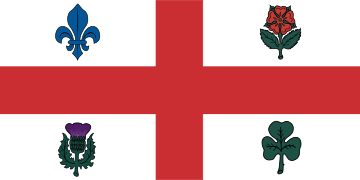Montreal Metropolitan Commission
The Montreal Metropolitan Commission (known in French as the Commission métropolitaine de Montréal) was an authority that was involved in municipal affairs affecting the urbanized part of the Island of Montreal.
History
When four municipalities (Montreal North, Saint-Michel, Pointe-aux-Trembles, and Laval-de-Montréal) were approaching bankruptcy, they requested annexation by the City of Montreal.[1] Montreal, then experiencing a budgetary crisis arising from its annexation of Maisonneuve in 1918, refused to consider this request, unless it annexed the more wealthy municipalities on the Island of Montreal at the same time.[1][2] As a compromise, the Quebec government established the Island of Montreal Metropolitan Commission in 1921,[3] which was renamed as the Montreal Metropolitan Commission in the following year.[4] The territory over which the Commission had jurisdiction was known as the Metropolitan District.[1]
The Commission existed until 1959, when it was replaced by the Montreal Metropolitan Corporation (in French, Corporation du Montréal métropolitain),[5][6] which was abolished in 1969 on the creation of the Montreal Urban Community.[7][8]
Composition
The Commission consisted of 15 members appointed from the following bodies:[9]
| Municipality | Number | |
|---|---|---|
| Montreal | Councillors | 7 |
| City Controller | 1 | |
| Westmount | 1 | |
| Outremont | 1 | |
| Verdun | 1 | |
| Lachine | 1 | |
| LaSalle, Saint-Pierre, Hampstead, Mount Royal, Saint-Laurent, and Montreal West | 1 | |
| Montreal North, Saint-Michel, Montreal East, Pointe-aux-Trembles, and Laval-de-Montréal[10] | 1 | |
| Provincial Department of Municipal Affairs (non-voting) | 1 | |
| Total | 15 | |
The following served as chairman of the Commission during its existence:[11]
| Years | Chairman |
|---|---|
| 1921–1927 | Joseph-Adélard-Azarie Brodeur |
| 1927–1932 | Joseph-Maurice Gabias |
| 1932–1934 | Dr Henri-Adonai Quintal |
| 1934–1938 | Winchester Henry Biggar |
| 1938–1941 | Joseph-Georges Caron |
| 1941–1954 | Joseph-Omer Asselin |
| 1954–1957 | Pierre DesMarais |
| 1958–1959 | Maurice Forget |
Functions
Except for the City of Montreal, no member municipality could issue bonds or contract non-temporary loans without the Commission's approval. Any municipality failing to meet its obligations could have its financial affairs taken over by the Commission, and all solvent municipalities were liable for the interest of the debts of the insolvent municipalities.[9] In 1953, the Commission's powers were enlarged to include expropriation.[12]
Extraterritorial jurisdiction of the City of Montreal
In 1935, the City of Montreal acquired the power to impose sales tax and income tax in the City as well as in the other municipalities under the control of the Commission,[13] and bylaws came into effect on 1 May 1935 for:
- a 2% sales tax on all sales taking place in the specified territory, or on goods being delivered to a person who resides or has a place of business in it,[14] which was the first retail sales tax to be imposed in Canada.[15]
- income tax on every individual having his residence, domicile, or place of business in the specified territory, which was set at 20% of the individual's liability for federal income tax for the previous taxation year.[16]
The amounts raised (net of administrative costs) were shared pro rata with the other municipalities within the Commission's territory.[17]
The imposition of sales tax would continue until 1964 (when the province would take over the field),[18] and the municipal income tax would be abolished with the implementation of the Wartime Tax Rental Agreements of 1941.[19]
References
- 1 2 3 Collin 2001, p. 7
- ↑ Sancton 1985, p. 28
- ↑ SQ 1921, ch. 140
- ↑ SQ 1922, ch. 105
- ↑ Collin 2001, p. 13
- ↑ SQ 1959, ch. 52, Div. 2
- ↑ SQ 1969, ch. 84
- ↑ Sancton 1985, p. 39
- 1 2 Sancton 1985, p. 29
- ↑ amalgamated with Pointe-aux-Trembles in 1924 by resolution of the Commission: see Collin 2001, p. 11
- ↑ Pineault 2000, p. 132
- ↑ SQ 1953, ch. 60
- ↑ SQ 1935, ch. 112
- ↑ "Public Notice: City of Montreal Bylaw No. 1336 - By-Law to impose a Sales Tax in the Territory of the City of Montreal and of Certain Municipalities under the control of the Montreal Metropolitan Commission". Montreal Gazette. 30 April 1935. Retrieved 22 March 2013.
- ↑ Christopher D. Ryan (1996). "A Municipal Cigarette-Tax Cinderella" (PDF). Canadian Revenue Newsletter. British North America Philatelic Society (13): 4–6. Retrieved 22 March 2013.
- ↑ "Public Notice: City of Montreal Bylaw No. 1337 - By-Law to impose an Income Tax in the Territory of the City of Montreal and of Certain Municipalities under the control of the Montreal Metropolitan Commission". Montreal Gazette. 30 April 1935. Retrieved 22 March 2013.
- ↑ Collin 2001, p. 9
- ↑ Albert John Robinson. Public Finance in Canada: Selected Readings. p. 262. Retrieved 17 March 2013.
- ↑ "Effect of Transfer of Tax Fields on City Budget Still Uncertain". Montreal Gazette. 9 April 1942. Retrieved 22 March 2013.
Further reading
- Andrew Sancton (1985). Governing the Island of Montreal: Language Differences and Metropolitan Politics. University of California Press. p. 213. ISBN 0-520-04906-3. Retrieved 22 March 2013.
- Jean-Pierre Collin (2001). "La gestion métropolitaine et les relations ville-banlieue à Montréal, depuis 1830" (PDF). Villes Régions Monde. Retrieved 22 March 2013.(French)
- Stéphane Pineault (2000). Rapports de pouvoir et enjeux métropolitains dans l'agglomération montréalaise, 1920-1961 : les problèmes de l'organisation institutionnelle, de la planification du territoire et du transport des personnes (PDF) (Ph.D.). INRS-Urbanisation. Retrieved 23 March 2013.(French)
- "Fonds de la Commission métropolitaine de Montréal. - 1921 à 1958" (in French). Canadian Archival Information Network. Retrieved 22 March 2013.

